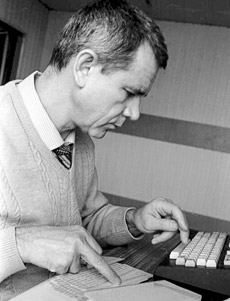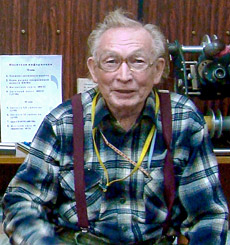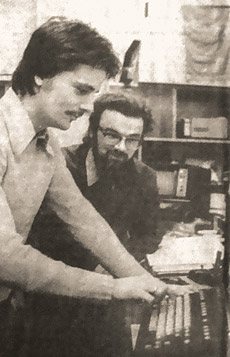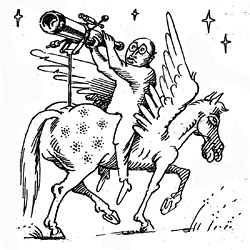
Electronic english version since 2022 |
The newspaper was founded in November 1957
| |
|
Number 4 (4752) |
To Russian Science Day
Sketches about physicists
Season 2
Science should be funny, exciting and simple. As such should be scientists.
P.L. Kapitsa
Theoretician of the era of computers
 |
| Vitaly Vladimirovich Pashkevich. 1983 |
Vitaly Pashkevich worked with Wilen Strutinsky and I wanted to invite him to the lecture by V.A.Karnaukhov about the first discoveries of the Laboratory of Nuclear Reactions, so that he, as a witness and participant in the events of those years, draws a line from the accidental discovery of a new type of nuclear isomerism carried out in Dubna at the first attempt of synthesizing element 104, to the new theory of fission of the atomic nucleus developed by Strutinsky in 1966. And luck - he is walking along Blokhintsev Street to meet me, reading a newspaper on the go, turning it in front of him like a sail.
"Hello!" I said.
He looked out from behind the newspaper, saw an obstacle in front of him, clarified the essence of the question asked and, in turn, asked:
"Do you know what Nilsson levels are? Then I will say easier ..."
He also simply explained why Strutinsky was pushed to the background, his undermined contribution to science (it seemed to me then): "Strutinsky did not hesitate to tell the fool that he was a fool." I immediately imagined who could be in the place of the fool and it all worked out.
And I failed to lure Pashkevich to the lecture of Karnaukhov. He remembered how he had worked for the CDC-6500, how his tasks had been considered for hours and now, the computer is on his table and performs similar tasks in seconds.
"I have not so much time left and I want to dedicate the rest of my life to them," he said something like that, speaking about personal computers. And he added: "They are so wonderful ..."
Strokes to the portrait
 |
| Evgeny Pavlovich at the meeting of the Council of the Museum on 31 August, 2009 |
Evgeny Shabalin is coming in, trying to be unnoticed - by a barrel, like Lenin, so as not to break the lecture that the guardian of the funds Kirill Kozubsky is reading to the excursionists, but one of them turns around, Kirill Eduardovich casts a look in the same direction and loudly announces:
"And here is the person I just talked about!"
It seems that the living classic of the world's only IBR-2 pulsed reactor has looked into the museum... All eyes rush in his direction. Feeling like an artist having taken a bow, Evgeny Pavlovich modestly asks:
"Do you need an exhibit? ..
He is called a person of adamant age and he completely agrees with it. What do you expect? The man has met the real Bohr. One of the students who he gives lectures to at the university once even asked: "Have you got acquainted with Rutherford?"
Over the years, Evgeny Pavlovich has had Lenin Sisopur. He has got a cane that he from time to time forgets somewhere and then walks around the city, looking into the institutions where he visited today: to the museum where he had tea, in the cafe "Vysotsky", where he drank coffee, in the cafe-confectionery "At Liya", where he was treated to low calorie cakes and in other entertainment institutions that we have a lot, although the citizens grumble for their failure.
Evgeny Pavlovich has even tried to grow the professor's beard to complete the appearance of the distracted professor, but nothing has come of it: through a noble professor's appearance, a pugnacious boy of Lyubertsy is still guessed and this is a city of coarse physical power and when he, a graduate of MEPHI, beginner physics engineer appeared in the personnel department of JINR, strict staff members did not even ask him where he got a black eye.
Evgeny Pavlovich believes that in order to achieve success in all things, there should be a leader and if he is in the case, he is a leader. His fiery, spontaneous speech when discussing the power at which IBR 2 will operate (it was held with the participation of Chairman of the State Committee for the Atomic Energy Academician Petrosyants) almost cost him a scientific career, but he got success and the reactor operated at 2 Megavatts.
At 70, Evgeny Pavlovich decided that it was time to write novels. So what? Life experience has already accumulated enough impressions, there is a lot of impressions, there is something to tell people about. "Maybe memoirs first?" the inner voice suggested. He rejected memoirs: "Early!" Thus, the trilogy was born about the physicist that was not devoid of adventurism, whom he without unnecessary ceremonies wrote off from his colleague Valery Lomidze (and partly, of course, from himself). After making sure that the novels are not read in our times, Evgeny Pavlovich took up small writings.
In one of his stories, Dmitry Mendeleev figures. A person is well familiar to him, close in spirit, in his youth he was like boiling water. In the story of Evgeny Pavlovich, Dmitry Ivanovich flies in a balloon and this is a historical fact: in the early morning of 19 August in 1987, according to the old style, Dmitry Ivanovich really flew on in the vicinity of Klin, the birthplace of Peter Ilyich Tchaikovsky and in the evening of the same day, he landed in the vicinity of the village Spas-Ugol, the birthplace of Mikhail Evgrafovich Saltykov-Shchedrin, where the peasants surrounded him and the rural headman promised: "Do not worry, we will take care of the balloon." And he added meaningfully: "And of you, too."
And then, the liberty fantasy of the writer is used. Dmitry Ivanovich, having disappeared from the field of view of the observers, crashes at the village of Verkhnyaya Trinity, the birthplace of Mikhail Ivanovich Kalinin and one of the five sons of the engineer of the roads, the future mathematician and translator of Euclid's Elements 11-year-old Dmitry Morduhai-Boltovskaya helps the scientist to continue the flight and then - everything was told by Mendeleev himself, including the singing of the roosters that came to him from below, the roar of Bykov and the invitation of the fisherman with a fishing rod: "Go down! There is fresh fish, we will make fish soup!"
... And after a few years, relaxing in the Health Resort "Tetkovo" near the upper Trinity, Evgeny Pavlovich was surprised to learn that local historians were already referring to his story as a historical document ...
Abroad of Viktor Zlokazov
 |
| Viktor Borisovich and the technician of "Robotron" Uwe Ghul from the GDR. Synchronous translation from German. 1979 |
As Chesterton said, the paradox is the truth that was put on the head to pay attention to it. Viktor Borisovich is a clear example. Even his colleagues that had worked with him side by side for many years and not everyone could see behind the peasant appearance (we all came out of the people) of a refined intellectual that mastered three European languages and knew Sanskrit.
But the insightful people that have such a quality on duty, they saw it in Viktor. Once, when he was on vacation, the phone rang at home. Viktor picked up the phone and heard the following:
- You are talking to Head of the International Department Veniamin Semenovich Shvanev. Can I talk to the Candidate of Physical and Mathematical Sciences Viktor Borisovich Zlokazov?
After making sure that it was him, Veniamin Semenovich went on talking:
"Could you help us out?" A group of German companions have arrived at the Institute and none of them speaks Russian. Could you work as a translator? We know that you know German excellently.
Viktor was surprised. What has happened, is there no translator in the International Department? Yes, Veniamin Semenovich knows German! Of course, Viktor did not say anything of it. He tried to get out - by the fact that he was on vacation. If the film was shot, then, in the next frame the audience would see how Veniamin Semenovich smiled at the other end of the wire. Someone who, but he knew that Zlokazov went to work on vacation - unless, of course, he left to cultivate the garden (but once he picked up the phone, then he was at home).
In general, they agreed. It came to Victor a few years later. He was invited to Leipzig and he was preparing for his first business trip abroad. The candidacy, as expected, was considered at a meeting of the party commission of the laboratory. Viktor had been non-partisan all his life, but the order was first of all. They heard the characteristic. Viktor Borisovich was morally stable, politically literate and in general, he impressed our person. Until someone asked about public work. And he got directly to the Achilles heel of Viktor. Viktor had public work, but some nonsense - he was engaged in the spread of DOSAAF brands. And then the attitude to his candidacy began to change. The question arose: is a person worthy of such a mild public burden to go abroad? The laboratory has many others that have everything with public work ...
The matter is bad, Viktor thought. And then, Veniamin Semenovich that kept silent hitherto (that of course, accidentally came to this meeting) asked about public work:
"Have you provided Viktor Borisovich with full-fledged public work? Have you offered him?"
And without waiting for an answer, he turned to Viktor:
"Would you like to do real public work?"
"Of course, I would like to," Viktor willingly confirmed and it became clear to everyone that this man was worthy of going abroad.
Thus, a business trip to Leipzig began for Viktor, where he regularly traveled, until in the late 1980s, away visas were canceled and with them - the party committee. And in 1991, Viktor wrote from Western Berlin: "And Berlin is a large city, there are a lot of mansion houses, there are a lot of sausages in the stores, but there are no sheep and the dogs are not evil" ...
Academics are joking
 |
| Drawing by Sergey Tyunin |
The fact is that Yakov Borisovich, after the atomic project, took up astrophysicism and as a creative person, immediately came up with his theory. Colleagues reacted skeptically to it and Yakov Borisovich himself was not completely sure of it. And at the next seminar of the Academician P.L.Kapitsa, Academician A.B.Migdal reads a telegram from Heisenberg, in which he calls Zeldovich's theory not only curious, but also very convincing. Universal excitement, Zeldovich rejoices. Having enjoyed this spectacle, Migdal draws attention to the fact that the first letters of the telegram are added to the phrase: "Vy vse duraki" ...
Zeldovich, as an intelligent person, answered the colleague through the journal "Success of Physical Sciences". In a review dedicated to the birth of electron-positron couples in strong fields, the Academician makes the footnote: "It is curious that the correct answer to the question of the structure of matter was given half a century ago by Russian poets. The feeling of a close relation between the microworld and the cosmos is expressed in the poem by Velimir Khlebnikov:
-
Mighty and huge,
The astral is far away.
You wish the explanation -
Know the atomoscope."
Penetrable people according to the first letters of Zeldovich immediately realized what Yakov Borisovich encrypted in this poetic message and who it was addressed to and the news that he was thinking about his Academy colleague flashed through the academic and university circles of the capital and even reached to older students of the Physical Faculty of Moscow State University - I remember how Kostya Chetyrkin, the future grandmaster of the Feynman's two-stale charts was laughing...
And the young professor from Dubna A.A.Tyapkin turned out to win from the intellectual match of the two academicians. An article dedicated to one confusing issue of relativity, against the publication of which Yakov Borisovich sharply objected, was published in the Physics-Uspekhi and even promised that he would leave the editorial board, if it was printed. And the editor of the magazine, in order to get rid of the author of the atomoscope, put the article in the nearest issue.
Alexander Rastorguev